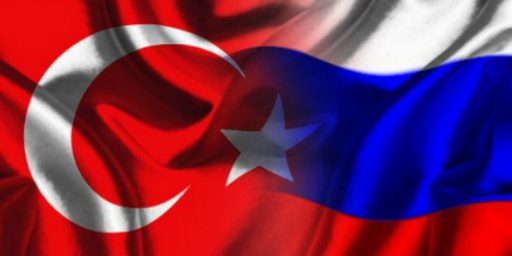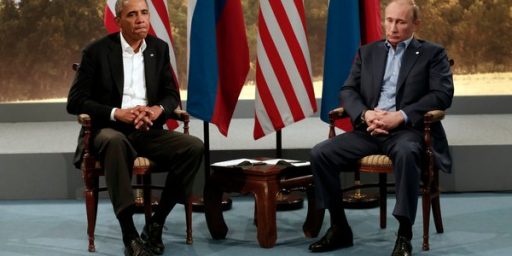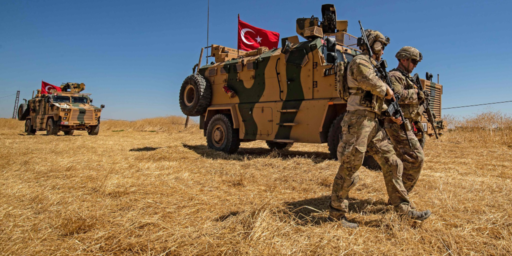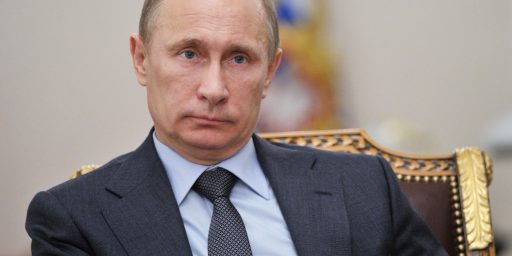The (non-)State of Syria
A piece from Foreign Policy notes:
Syria, after all, is today divided into no less than seven enclaves: the territory controlled by the regime, three separate areas of rebel control, two Kurdish cantons, and the Islamic State area. What is the government’s strategy to reverse this fragmentation, I ask? ”We have absolute faith that this is a temporary situation,” Tourjman replied. “[T]he major reason for this faith is that the Syrian people start to understand the conspiracy against them.”
In other words, there is no strategy at all, but the kind of conspiracy theories that no self-respecting Baathist should be without. In fact, no evidence exists of any overarching plan to divide Syria — nor do any of the major forces in the country support its breakup. Syria’s de facto division is a result of the inability of any force to prevail over all the others, not of design.
In regards to the future and Russia’s role:
As the fighting in eastern Aleppo showed, the government side only makes real progress when the Russians commit to ensuring its victory. So the crucial question is of Russian, not Syrian, intentions — and Moscow may well have already achieved most of what it came to Syria to achieve. It has ensured the safety of its bases in Latakia province and the survival of its regime allies, demonstrated the efficacy of Russian arms, and guaranteed there can be no diplomatic process to settle the war without Moscow’s involvement.
These are significant accomplishments. But it is also the case that a further Russian commitment to finishing off the rebellion could result in the unpleasant situation in which a cash-strapped Russia finds itself saddled with the responsibility for the reconstruction of a ruined Syria on the basis of “you broke it, you own it.”
The whole piece is worth a read.





Modern Syria is basically a Western Creation. It does not exist without force.
Andre, This is said about any number of countries and regions, but I wonder if it as over simplification. It seems that the historical norm is for countries or kingdoms or city states to be built up over an era by chance, caprice and violent, bloody ambition, and then spend the next 100 years or so devolving into a mess. Just look at the map of Poland over the past centuries, or the the history of the Ottoman Empire, or really any entity described by that word, “empire”.
I guess it leave me with this question: What is the US interest in Syria? Why are we investing here in arms, diplomacy, and possibly future blood? What is our expected return?
@MarkedMan: Many years ago I read H. G. Wells, The Outline of History. The edition I read had a page of maps of Poland over time. They would have made a nice cartoon flip book as Poland changed shape and size and wandered all over central Europe and the Baltics. I don’t recall that there was a single square mile that remained continuously in Poland over time.
I recently read, The Vanquished, Why the First World War Failed to End, by Robert Gerwarth. It’s a history of the violent chaos that followed the breakup of the Russian, Austrian, and Ottoman empires. Much of it devolved into trying to form uniformly ethnic states, often aided and abetted by the British and French. It’s easy to see how Hitler emerged out of a general swamp of nationalism and bigotry.
@MarkedMan: Poland can be Poland with a Democratic government while being a member of NATO and the EU. I don’t think that Syria can be controlled by any kind of regime that resembles a Democratic Regime. In the end would have the Alawites being massacred by the Sunnis while the Alawites would need brutal force to control the majority of the population, that’s Sunni. That’s incredibly similar to Northern Ireland.
Part of the problem of the so called ‘Islamic State” is that a country with the Western/Northern(And Sunni) portion of Syria and the Northern portion of Iraq makes complete sense.
The original idea of the Kingdom of Syria – with modern day Syria, Israel, Lebanon and Jordan – made more sense. But that was killed by the French.
I generally liked the article but would beg to differ on his “no strategy at all”.
I believe it likely the Russians have at long last agreed to “safe zones” is a gambit designed to concentrate the rebels, not as an appeasement. Inside those places the Jihadis and non-Jihadis must struggle for control and the areas will either become hot-beds of terrorists (and thereby “roach hotels”, Jihadis “check in” but….) or gatherings of people who can eventually, maybe, be brought back into the fold with amnesty or some other incentives.
The action in the east this week only indicates we are willing to fight to keep some sort of buffer state between Iran/Iraq and the Levant IMO. IOW, it was driven by the “Shia crescent” narrative, which, wrong or right, lives and can be expected to have a heck of a half-life. It’s a biggy to the Saudis and to Israel. It may be the author’s extension of that incident’s logic into all the other areas is, a least, premature.
Time should tell.
This dismantling of Syria is the result of an insurgency sponsored by Saudi Arabia with significant US help. The President is in Saudi Arabia working to tie the US closer to the Sauds. I believe that a balance of powers between Riyadh and Teheran is more fruitful for our country. The Sauds are the spiritual and financial fathers of Al-Qaeda and certainly always working to increase the price of oil. We are supporting a war in Syria that has destroyed 200-400 thousand lives and made 2 million refugees.
Wow I deeply hope that peace reigns in our country and in the world. http://blogdothiago.com
@Scott:
Stability is what we’d like to see. We know we can’t have peace in the ME, so we’ll settle for that.